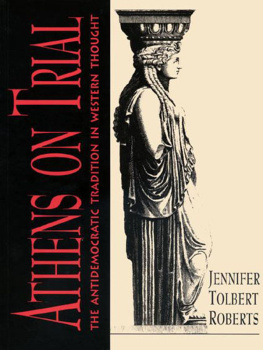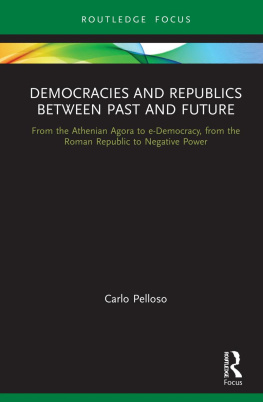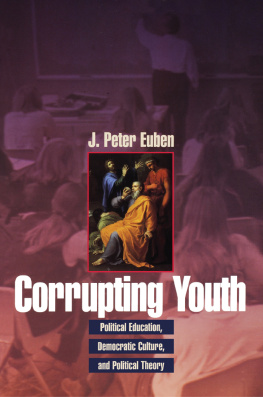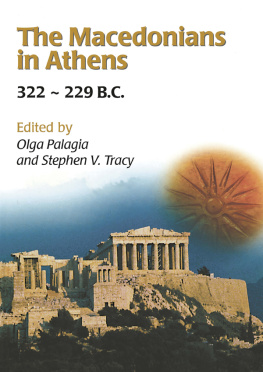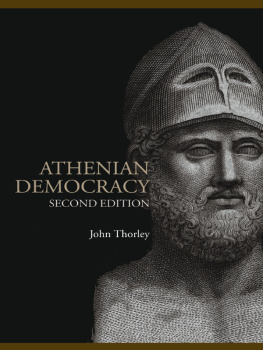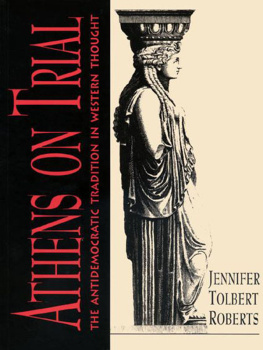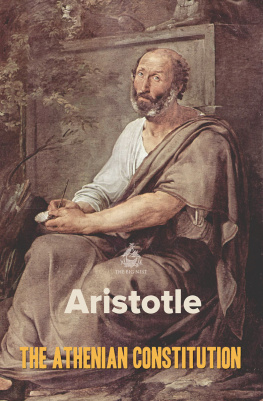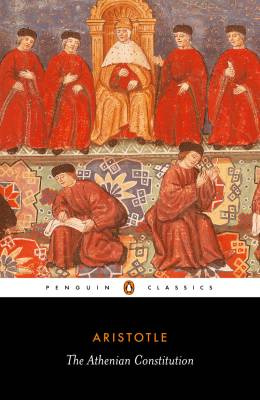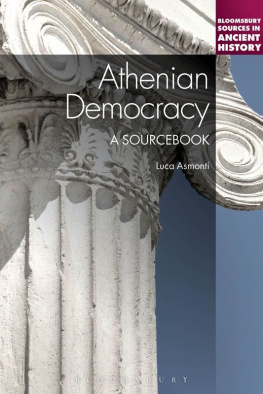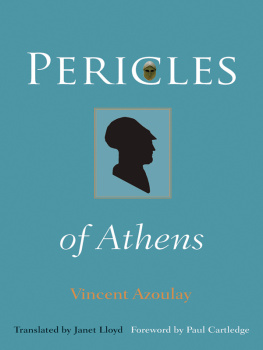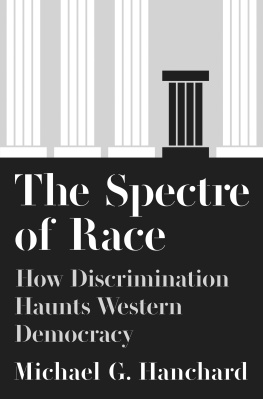ATHENS ON TRIAL
ATHENS ON TRIAL
THE ANTIDEMOCRATIC
TRADITION IN WESTERN THOUGHT
JENNIFER TOLBERT ROBERTS
PRINCETON UNIVERSITY PRESS
PRINCETON, NEW JERSEY
Copyright 1994 by Princeton University Press
Published by Princeton University Press, 41 William Street,
Princeton, New Jersey 08540
In the United Kingdom: Princeton University Press,
Chichester, West Sussex
All Rights Reserved
The citation from the Aeneid is from The Aeneid of Virgil by Allen Mandelbaum. Translation copyright 1971 by Allen Mandelbaum. Used by permission of Bantam Books, a division of Bantam Doubleday Dell Publishing Group.
Citations from Homers Iliad and Euripides Suppliants appear courtesy of University of Chicago Press, from The Iliad of Homer, translated by Richmond Lattimore, copyright 1951 by the University of Chicago, and the translation of Suppliants by F. W. Jones in The Complete Greek Tragedies, ed. Richmond Lattimore and David Grene, copyright 1958 by the University of Chicago.
Excerpts from The First and Second Discourses by Jean-Jacques Rousseau, translated, edited, and annotated by Victor Gourevitch, copyright 1986 by Victor Gourevitch, reprinted by permission of HarperCollins Publishers.
Citations from The Politics of Aristotle translated by Ernest Barker (Oxford, 1946) appear by permission of Oxford University Press.
Citations on pp. 11215, from Plutarchs Lives, collected in The Rise and Fall of Athens and translated by Ian Scott-Kilvert (Penguin Classics, 1960), copyright 1960 by Ian Scott-Kilvert, reproduced by permission of Penguin Books Ltd.
Library of Congress Cataloging-in-Publication Data
Roberts, Jennifer Tolbert, 1947
Athens on trial : the antidemocratic tradition in Western thought /
Jennifer Tolbert Roberts.
p. cm.
Includes bibliographical references and index.
ISBN 0-691-05697-8 (CL)
ISBN 0-691-02919-9 (PB)
1. DemocracyGreeceAthensHistory. 2. DemocracyHistory. 3. Political scienceHistory. I. Title.
JC79.A8R63 1994
321.809385dc20 93-24553
This book has been composed in Adobe Goudy
Second printing, and first paperback printing, 1996
Princeton University Press books are printed on acid-free paper and meet the guidelines for permanence and durability of the Committee on Production Guidelines for Book Longevity of the Council on Library Resources
Printed in the United States of America by Princeton Academic Press
10 9 8 7 6 5 4 3 2
For Bob
Whence comes it, this universal big, black Democracy?
Thomas Carlyle
CONTENTS
CHAPTER ONE
Introduction
CHAPTER TWO
The Athenian Experiment
CHAPTER THREE
The First Attacks on Athenian Democracy
CHAPTER FOUR
Democracy and the Philosophers
CHAPTER FIVE
Roman Adaptations
CHAPTER SIX
Recovering the Greeks
CHAPTER SEVEN
Monarchists and Republicans
CHAPTER EIGHT
The Debate over Athens and Sparta
CHAPTER NINE
Athenian Democracy in the Age of Revolutions
CHAPTER TEN
A Shift in the Sands
CHAPTER ELEVEN
The Turning of the Tide
CHAPTER TWELVE
Athenians and Others
CHAPTER THIRTEEN
Epilogue: The Old and the New
PREFACE AND ACKNOWLEDGMENTS
D RAWING ON Nietzsches Gay Science, Foucault identified truth as undoubtedly the sort of error that cannot be refuted because it was hardened into an unalterable form in the long baking process of history. It is a very long baking process indeed that I seek to undo in this book.
For centuries Athens has enjoyed a reputation as the unrivaled artistic and intellectual center of the Greek world. Bearing in mind Pericles description of his city as the school of Hellas, many a modern metropolis has sought to exalt itself by posing as the cultural heir of the Athenians. Renaissance Florentines styled their city-state a second Athens, and Wittenberg cast itself as Athens on the Elbe; Edinburgh has claimed to be a new Athens; Bogot dubs itself the Athens of Latin America; and in the United States, Boston has put itself forward as the Athens of the Northeast, Transylvania College of Kentucky has purported to be the Athens of the West, and both Atlanta and Nashville have claimed the name of Athens of the South (though only Nashville has built its own Parthenon.) To appropriate the mantle of the school of Hellas, however, is not to support the Athenians unusual form of government either as a phenomenon unique in time and place or as an example to be followed in other times and places. Throughout most of Western history, Athenian democracy per se has been in bad odor. It is important to remember this in a world in which democracy has, in the words of political scientist John Dunn, become the moral Esperanto of the present nation-state system, the language in which all Nations are truly united. Once democratic principles became synonymous with legitimacy in government, the democracy of the Athenians was accorded a place of great honor in the pantheon of political regimes. It should not be imagined, however, that Athenian government served as the inspiration for the democratic movement that gathered force in modern Europe and America in the age of revolution. Now regarded as a legitimizing ancestor, classical Athens was for centuries excluded from the company of respectable governments. Modern democracies, of course, are given to putting themselves forward as the Athenians heirs, rather like the usurpers who became emperors of Rome through military coups and then piously adopted themselves into the families of their predecessors. The reality is quite different. It would be too simple to suggest that modern democracies came into being in spite of Athenian democracy rather than because of it. In reality, much of the important political thinking of the West derived from thinkers like Plato and Aristotle who, though fundamentally opposed to Athenian democracy, were nonetheless very much its products. But prior to the age of revolution there was little in the reputation of Athenian government that was likely to inspire emulation. Rather, Athens served as a foil the better to set off the virtues of governments that accorded far less power to the untutored masses.
The hostile tradition about Athenian democracy, which has its roots in ancient Athens itself, forms the subject matter of this book. Why, I have asked, has Athenian government been the focus of so much opprobrium? If Athenian government was really not so bad, why should so many people have thought it was; and if it truly was as terrible as it has often been made out to be, why should its critics continue to devote so much time to demonstrating its weaknesses again, and again, and again? Beginning in class bias and developing into an intellectual construct with a life of its own, the anti-Athenian tradition has become a crucial building block of Western political thought. How did this tradition begin, and, once begun, how did it gather strength?
My exploration of these questions has led me to examine a large body of literature written over several centuries and in a variety of languages, and it calls for a few words on methodology. First, there is the question of primary versus secondary sources. The works of twentieth-century scholarship that I cite in the notes have plainly been designated as references, authorities of some kind with which I have interacted in a different way from the way in which I have interacted with the texts I analyze. This designation is, of course, entirely arbitrary; it may and should be discarded by any reader who investigates the origins of these modern texts. My own ability to probe the sources of peoples thinking is limited by the same factors Protagoras reputedly identified as preventing certain belief in the godsthe shortness of life and the difficulty of the subject matter. Now if I had written a book on Greek tragedy, I would have made reference to the work of Aeschylus and Sophocles and Euripides, and I would have made reference to the work of Karl Reinhardt and Charles Segal and Helene Foley and Froma Zeitlin, and everyone would understand that I approached these two sets of texts in very different ways. Because I am part of everyone, I would also understand this myself. But I have not written a book on Greek tragedy. Instead, I have written a book about how people think about Athens and, more broadly, about how they think about politics and society. When an author writes about intellectual genealogy, an ineluctable paradox cuts him or her off from
Next page
